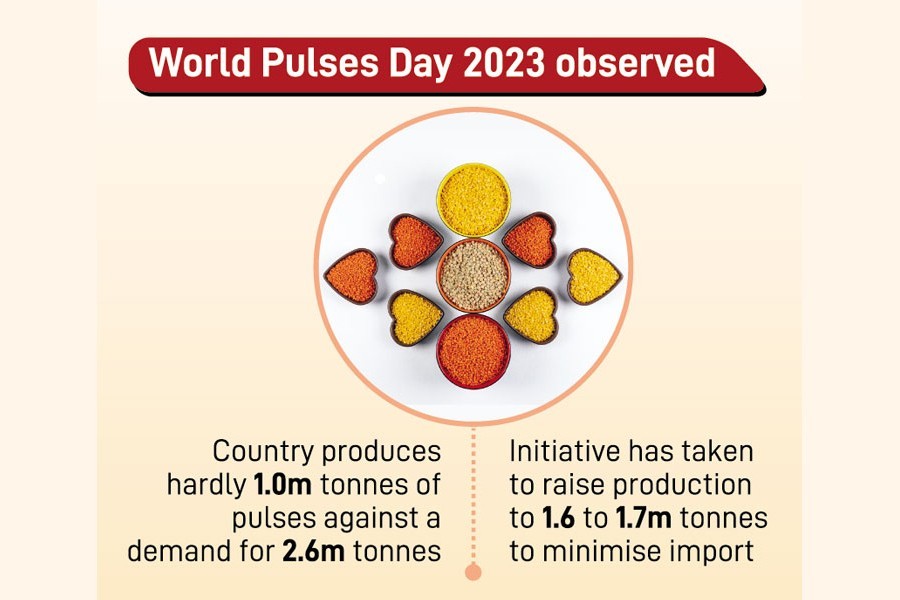The country's per capita daily pulses deficit is 28 grams amid a scanty local output, forcing to spend up to Tk70 billion annually for its import.
The above information was revealed at a seminar held at the Bangladesh Agricultural Research Council (BARC) Auditorium in the city on Friday, on the eve of World Pulses Day 2023.
The Pulses Research Center under the Bangladesh Agricultural Research Institute (BARI) organised the event.
It is the first time Bangladesh is observing World Pulses Day with the theme "pulses for a sustainable future'.
Agriculture secretary Wahida Akhter said the country produces hardly 1.0 million tonnes of pulses against a demand for 2.6 million tonnes.
She added a massive volume of pulses including lentils, mung, gram, green pea etc are being imported.
She said the country has to spend up to Tk70 billion for importing pulses.
"We are going to take initiative to raise production to 1.6 to 1.7 million tonnes to minimise import as well as to reach daily intake up to the mark," said the secretary.
BARC executive chairman Sheikh Bakhtiar, BADC chairman Abdullah Sajjad, BARI director general Dr Debashish Sarker, BARC member director Mostafizur Rahman, BARI Pulses Research Center director Md Mohiuddin, ACI Agribusiness managing director Dr FH Ansarey, among others, also spoke.
BARI presented a paper which showed the country's daily intake of pulses per head is 17 grams (gm) against the World Health Organisation (WHO)'s prescribed requirement of 45 gm.
It showed a 28 gm of pulses deficit per head per day in the country when nutritionists are highly insisting on plant protein intakes. Debashish Sarker said wide modern high-yielding varieties have been developed by BARI.
"Cultivation of these high-yielding varieties and adoption of modern technology could raise the yield to 2.5 tonnes per hectare which are now only 1.0 tonne," he said.
He said pulses production could be raised substantially on less land.
According to the UN's Food and Agriculture Organisation (FAO), this year's World Pulses Day's theme "pulses for a sustainable future" highlights how pulses - the edible seeds of leguminous plants such as beans, lentils, peas and chickpeas - are increasing the resilience of farming systems and improving lives thanks to their low water footprint, drought tolerance and resistance to climate related-disasters.
It also focuses on the global pulses sector, and how it could be a positive driver to ensure the resilience of regional and global supply chains.
It also put spotlight on enabling consumers to access nutritious foods, and on contributing to a sustainable use of natural resources in the production of pulses, said FAO.
FAO Director-General, QU Dongyu in his message said pulses could contribute to increasing the resilience of farming systems.
Pulses also could help improve soil biodiversity and are crucial components of multiple cropping systems, he said.
According to the Bangladesh Bureau of Statistics, only 0.42 million hectares of land have so far come under pulses farming in the country of which lentil and khesari comprise 50 per cent.
Trading Corporation of Bangladesh data showed the price of lentils, largely consumed pulses, increased by 10-15 per cent in a year.
Finer lentil was sold at Tk 135-150, coarse and medium lentils at Tk 105-120 a kg in the city market on Friday.


